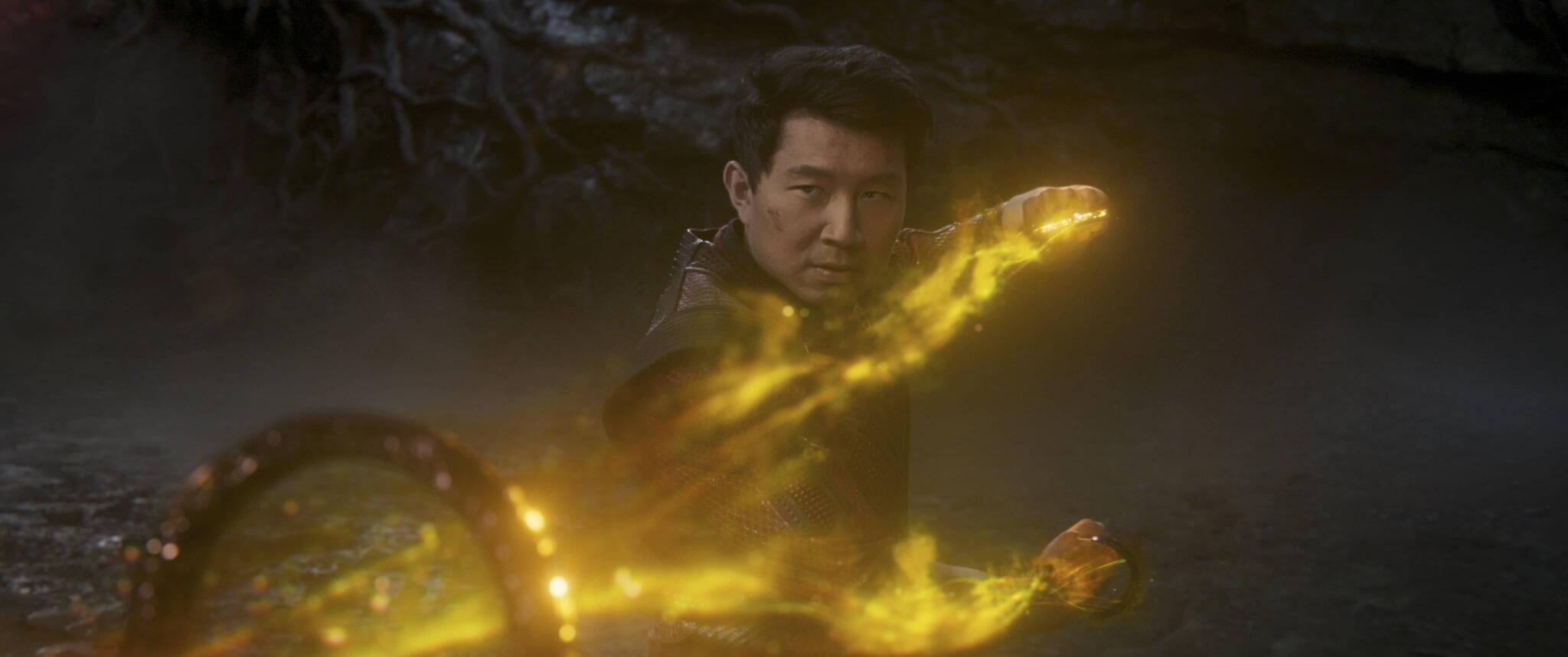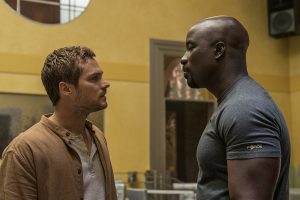I don’t want to be *that* Asian American raving about Shang-Chi and its nearly all-Asian cast. But as a Chinese-American woman who once flirted with the entertainment industry myself, I could not help but feel a sense of pride, awe, and joy watching the newest Marvel film in theaters—my first time stepping in an AMC in two years.
Asian actors could be cool, too.
The portrayal of Asian characters on film has always been extremely personal to me. Growing up in Orange County, CA, just about an hour south from Hollywood, I had the childhood dream of becoming an actor. I loved the arts, I loved the theatre, and I certainly loved the sensation of escaping my own reality to fill a character’s shoes, even for a moment. Watching teenagers on Disney Channel following their dreams made me want to follow mine, too.
As a young kid I was “scouted” by some talent agents at the mall who convinced my parents that I might be a good fit for acting. The exact details are fuzzy, but I remember commuting to and from Los Angeles frequently to recite different snippets of a script for various people. By four years old, I had signed with Clear Talent Group—then a startup talent agency and now one of the largest names in Hollywood—and auditioned for commercial after commercial, not exactly knowing what I was doing. I recall taking acting and modeling classes, where I learned how to talk and walk. I did photoshoots, trying out various “looks.” I followed the instructions without asking many questions, believing the words that they told us: “if you work hard, you’ll make it.”
My mother, then a full-time attorney who moonlighted as my chauffeur to these gigs, was the only one to tell me I was not like the rest. “You’re Asian,” she would say. “Don’t be disappointed if it doesn’t work out.”
After a couple of years, this part of my life stopped. I was so young I don’t remember why. It must have had something to do with my parents’ busy schedules; I could not blame them for no longer having time to drive me around (each roundtrip took at least two to three hours).
But when I was in the third grade, my passion for the performing arts yanked the distant memories from somewhere in my mind, and I once again felt the urge to re-enter the entertainment world. By then, I had grown older, excelled in school, and was beginning to feel a greater sense of self.
I joined Kids! Management, a background management company in Hollywood that supplied the background actors for commercials, television shows, movies, and more. I received the opportunity to be an extra for shows like Disney’s Jessie, Touch, Quest, and Kirby Gates, as well as a handful of TV commercials. Yet no matter how hard I pitched my resume and headshots to talent agencies for film and television representation, I would never hear back.
I realized by the age of 13 that my opportunities as an Asian American actor were slim. I finally signed with a manager who worked with me on my demo reels, prepared me for auditions, and worked to sign me with an agency. Despite putting in the hard work, I realized that most agents already filled their quota for my “type”: young, Asian, and female. Scrolling through various talent agency websites, I saw a whole range of White girls—fat, skinny, curly hair, straight hair, blondes, brunettes—a few Black girls, and two or three Asian girls at most, usually with bangs and tiny eyes.
I struggled to sign with anyone, not due to a lack of skill, but because agents already had someone who looked like me, and there weren’t many roles for my “type” in the first place. No matter how many classes I took, showcases I attended, nor demo reels I sent, the response was silent. I was doing everything right, but no one wanted me.
Eventually, I succeeded in securing an agent who began to send me on more auditions. Yet the parts I could pursue were few and vague: supporting roles such as “Teenage Girl,” “Daughter,” and “Student.” I rarely received auditions for lead/recurring roles. Had anyone ever seen an Asian American girl headline a television show? Definitely not at that time.
“It seems like you’re not ‘Asian’ enough, and you’re obviously not white,” my mom frequently observed. Indeed, I did not have the right “look” despite having two parents of Chinese descent. Whenever I auditioned for a role meant for an Asian actor, I still felt out of place. I didn’t have slanted eyes, a monolid, nor a flat nose or face, and most other auditionees did. After all, these were the features most casting directors believed Asians on TV should possess. It was hard enough to secure generic roles for “young teen,” parts that could theoretically be filled by girls of any race; how could I compete in a market that never casted girls who looked like me?
Furthermore, the majority of gigs that called for Asian actors revolved around the same stereotype: quirky, quiet, and nerdy. On the Disney Channel, I sat with the “nerds”; for commercials, my wardrobe was eccentric. The only “normal” role I snagged was a quick appearance as “Teenage Girl” in a commercial for Disneyland Paris, where my counterpart was a White girl. As much as I wanted my acting abilities to shine, my outer appearance always preceded it.
By high school, I reluctantly began to accept that Hollywood was simply not the right world for me at that moment in time. Luckily, I still had academics to lean on, and I made the difficult decision to leave the entertainment industry. My childhood dreams would have to wait.
My story as an Asian American child actor is not unique. Throughout the many years I dabbled around in Hollywood, the few Asians I met told me they experienced the same sense of isolation. This is why shows like Fresh Off the Boat and later Andi Mack were so groundbreaking. Crazy Rich Asians, of course, made history as the first major Hollywood picture with an all-Asian cast and first Asian American lead in 25 years (after 1993’s The Joy Luck Club). However, despite its success, it still fed into a stereotype of Asians being wealthy, indirectly fueling the model minority myth within the U.S. Nonetheless, when I watched behind-the-scenes interviews with members of these accomplished casts, I empathized with their struggles within the industry. Even Constance Wu had considered quitting.
Shang-Chi and the Legend of the Ten Rings was empowering because it actively sought to dispel the image of Asian Americans as weak, submissive, and inferior. It juxtaposed the Asian American experience with the Asian experience. It even incorporated full scenes in Mandarin, allowing the authenticity of my culture to shine through. Sitting there at the Georgetown AMC the day after Shang-Chi opened in theatres, I could hardly believe that it took more than two decades since I first tried my hand in Hollywood for the industry to get this far.
In the past, the portrayal of Asian Americans on film has always blurred the lines between Asian American characters who live in the U.S. and Asian characters from Asia. When Mulan came out, Hollywood lauded the “Asian princess.” Even Crazy Rich Asians, which featured Asian actors from all over the world, was simply touted as a breakthrough for Asian actors–disregarding the nuance of the Asian American experience. Yet Awkafina’s character “Katy,” a Chinese American who notoriously could not speak Mandarin, contrasted tremendously against “Shang-Chi,” who grew up in China; we are now living in an era where the kids of first-generation immigrants may not speak the language of their parents, and it is important that Asian and Asian American characters both reflect this shift and depict their differences. Shang-Chi did a phenomenal job at this, especially since American characters bore American names while Chinese characters bore Chinese names.
Shang-Chi’s release was also timely. After a year of spiked hate crimes against Asian Americans due to the COVID-19 pandemic, this was the antidote we needed to begin healing. Instead of playing into the aforementioned, cliché narratives, Marvel’s first Asian superhero movie celebrated Chinese culture and highlighted the Chinese American identity. By featuring tenacious yet relatable characters, the movie allowed anyone, no matter their race, to identify with the characters (and their conflicts) within the film. We also cannot ignore the fierce female characters who demonstrated both the patriarchal, “重男輕女” (zhong nan qing nu) traditions of the past alongside the women’s empowerment movement of the modern day.
I hope those who watch Shang-Chi will leave with a newfound understanding of Chinese culture and of those who identify as Chinese American. While my own hopes of returning to the entertainment industry anytime soon are slim given the change in my life’s trajectory, my pride in the progress Asian Americans have made in Hollywood will never cease.
Walt Disney once said that “All our dreams can come true if we have the courage to pursue them.” For now, however, I’m perfectly content watching others fulfill my childhood dream.





